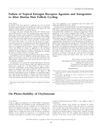February 2024 in “Animals” Hair loss peaks in spring and regrowth in late summer, with pregnant females losing the most hair.
December 2023 in “Animals” The research found genes and miRNAs that may control hair growth in Forest Musk Deer.
 January 2011 in “Journal of biological research”
January 2011 in “Journal of biological research” Endocrine disruptors may cause early hair loss.
 107 citations,
September 2002 in “Journal of Investigative Dermatology”
107 citations,
September 2002 in “Journal of Investigative Dermatology” Researchers found that hair shedding happens mostly when new hair is growing and involves a unique process.
 127 citations,
December 2007 in “Journal of Investigative Dermatology”
127 citations,
December 2007 in “Journal of Investigative Dermatology” Mice hair growth patterns get more complex with age and can change with events like pregnancy or injury.
 72 citations,
April 2008 in “Organogenesis”
72 citations,
April 2008 in “Organogenesis” Wnt signaling is crucial for skin and hair development and its disruption can cause skin tumors.
 52 citations,
June 2013 in “The Journal of Clinical Endocrinology and Metabolism”
52 citations,
June 2013 in “The Journal of Clinical Endocrinology and Metabolism” The research found that anovulatory young women have higher androgen and hormone levels than those who ovulate, suggesting immature hormonal regulation rather than a specific condition.
 9 citations,
September 2012 in “Clinical Endocrinology”
9 citations,
September 2012 in “Clinical Endocrinology” More than half of patients who had acromegaly surgery experienced hair loss, with varying degrees of recovery.
 8 citations,
July 2014 in “General and Comparative Endocrinology”
8 citations,
July 2014 in “General and Comparative Endocrinology” Finasteride affects frog testes by increasing testosterone, decreasing 5α-DHT, and impacting genes related to reproduction and other functions.

Early identification of lupus through skin signs and blood tests is crucial in India.
43 citations,
July 2003 in “Andrology” Hormonal male contraception is effective and could be market-ready, but more research is needed to ensure safety for all ethnic groups.
 September 2012 in “Hair transplant forum international”
September 2012 in “Hair transplant forum international” The document concludes with the creation of a Hair Transplant Foundation after reviewing the early hair transplant techniques and discussions from a forum.
154 citations,
October 1996 in “Proceedings of the National Academy of Sciences of the United States of America” Estrogen affects hair growth and skin cell multiplication.
 113 citations,
April 1999 in “The Journal of Clinical Endocrinology and Metabolism”
113 citations,
April 1999 in “The Journal of Clinical Endocrinology and Metabolism” Cyproterone acetate-estrogen most effective for hirsutism, but consider side effects and patient needs.
 77 citations,
April 2004 in “Gene expression patterns”
77 citations,
April 2004 in “Gene expression patterns” The three estrogen receptor genes are highly expressed in zebrafish neuromasts during development.
71 citations,
February 2000 in “Endocrinology and metabolism/American journal of physiology: endocrinology and metabolism” Estradiol stops hair growth in mice, but an antagonist can reverse this effect.
68 citations,
May 1991 in “The Journal of clinical endocrinology and metabolism/Journal of clinical endocrinology & metabolism” Both cyproterone acetate and spironolactone effectively reduce hair growth in women with hirsutism.
58 citations,
February 2018 in “Journal of cosmetic dermatology” Estrogen helps keep skin healthy and may make women look younger and more attractive.
 27 citations,
April 1998 in “American Journal of Dermatopathology”
27 citations,
April 1998 in “American Journal of Dermatopathology” Estrogen and progesterone don't directly affect hair growth in androgenic alopecia and alopecia areata.
 23 citations,
April 1999 in “The Journal of Clinical Endocrinology and Metabolism”
23 citations,
April 1999 in “The Journal of Clinical Endocrinology and Metabolism” All treatments reduce hair growth; low dose flutamide most effective with fewer side effects.
 22 citations,
March 2004 in “Dermatology”
22 citations,
March 2004 in “Dermatology” Topical estrogen helps hair growth in menopausal women with no major side effects.
18 citations,
August 2019 in “Clinical breast cancer” Local hormonal treatment for vulvovaginal atrophy is likely safe for women with estrogen receptor-positive breast cancer on aromatase inhibitors.
 14 citations,
December 2010 in “Seminars in Oncology”
14 citations,
December 2010 in “Seminars in Oncology” Rare adrenal cancers that secrete androgens or estrogens have a poor prognosis and are treated primarily with surgery.
 9 citations,
March 2020 in “Gene”
9 citations,
March 2020 in “Gene” Certain gene variants in estrogen receptors are linked to polycystic ovary syndrome, mainly affecting metabolism, in Tunisian women.
 8 citations,
January 1998 in “Journal of Investigative Dermatology”
8 citations,
January 1998 in “Journal of Investigative Dermatology” Topical estrogen treatments did not change hair growth in certain mouse strains, questioning previous findings on their role in hair growth control.
3 citations,
August 2021 in “Nutrition research” Estrogen affects how vitamin A is processed in mouse skin, which may impact acne treatment, hair growth, and skin defense.
 3 citations,
December 2016 in “Journal of epidemiological research”
3 citations,
December 2016 in “Journal of epidemiological research” Estrogen and androgenic hair increase melanoma risk, especially in European-ancestry individuals.
 3 citations,
May 2016 in “Dermatology Online Journal”
3 citations,
May 2016 in “Dermatology Online Journal” Changing estrogen levels during menopause might affect genes related to body rhythms and cause increased hair loss.
 1 citations,
January 2002 in “Journal of Clinical Dermatology”
1 citations,
January 2002 in “Journal of Clinical Dermatology” Hair loss in androgenic alopecia may be linked to increased local androgen activities, but not to estrogen levels.
 October 2024 in “Journal of the Endocrine Society”
October 2024 in “Journal of the Endocrine Society” Estrogen alone can lower testosterone in some transfeminine people.




















